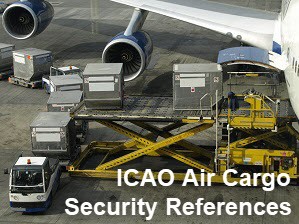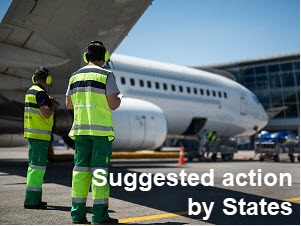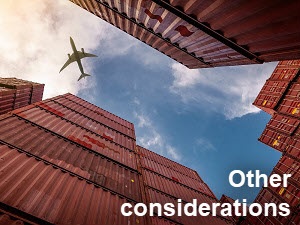The Distribution of COVID-19 Vaccines and Air Cargo Security
The coronavirus pandemic has posed unprecedented challenges globally and has had a significant impact on the international air transport sector. As COVID-19 vaccines are being progressively rolled out, the speed of their delivery is key to effectively combating the pandemic.
Regulators around the world may need to take exceptional measures to ensure that COVID-19 vaccines are distributed successfully to support global recovery efforts. However, the use of alternative security measures, should be strictly limited, be applied on a temporary basis, and clearly defined in a State's National Civil Aviation Security Programme.
This page is intended to help States and Industry apply aviation security measures while facilitating a smooth flow of vaccines throughout the supply chain and to the final destination.
To facilitate the safe, secure, and effective distribution of COVID-19 vaccines as air cargo, States are encouraged to apply the guidance provided in Chapter 13 of the ICAO Aviation Security Manual (Doc 8973 - Restricted) and in this website.
 |  |  |
ICAO Air Cargo Security References
Annex 17
Annex 17 – Security in Chapter 4.6 requires that air cargo and mail shipments be secured and protected from unauthorized interference before being loaded on board a commercial aircraft. Implementation of aviation security procedures for the secure transport of vaccines includes: screening where it is practicable; implementing secure supply chain procedures; and by applying exemptions from screening for biomedical materials (BIOM).
States may also wish to take into consideration other Annex 17 Standards and Recommended Practices (SARPs) which may be applicable in their context for ensuring the security of COVID-19 vaccine shipments and transport operations in the civil aviation environment, such as the conduct of effective risk assessments1, landside security measures2, and requirements relating to cybersecurity3.
Aviation Security Manual
Chapter 13 of the ICAO Aviation Security Manual (Doc 8973 – Restricted) provides guidance on how States should establish an air cargo and mail secure supply chain. Secure supply chain measures are a robust method for securing COVID-19 vaccines, whilst ensuring a smooth flow of the shipments throughout the supply chain. The State’s Appropriate Authority for aviation security (AA) must approve and exercise oversight over regulated agents, known consignors, and/or other entities approved by the AA, so that cargo handled by these entities can be considered ‘known cargo’, and be loaded on board commercial aircraft without the need to undergo additional security screening.
Where secure supply chain measures are not available, paragraphs 13.5.5.15 and 13.5.5.16 of Doc 8973 provide guidance on alternative security measures to secure special categories of air cargo and mail, in compliance with ICAO Annex 17 – Security. Due to the unusual storage conditions needed by some COVID-19 vaccines, screening may not be an effective means of securing such shipments. Where screening and secure supply chain processes cannot be applied, the AA may allow for alternative security procedures (e.g. verification of accompanying air way bills; visual inspections for any signs of tampering, etc.) to be applied to secure COVID-19 vaccine4 shipments for carriage on commercial aircraft. Please refer to paragraphs 13.5.5.15 and 13.5.5.16 of Doc 8973 for further information.
Suggested action by States
Further suggested actions by States for the secure transportation of COVID-19 vaccines in line with applicable ICAO aviation security provisions are as follows:
a) for securing of COVID-19 vaccines via a State’s supply chain security process (where such a process is already established by a State’s AA), States should:
i. identify entities involved in the manufacture, handling, and transportation of COVID-19 vaccines, and provide them with sufficient information on how they can be approved as Known Consignors or Regulated Agents under a State’s supply chain security process, if they have not already been approved; and
ii. consider granting Known Consignor status urgently to approved production facilities for COVID-19 vaccines, taking into account such entities may already have supply chain security policies and procedures in place, and may be overseen by other State authorities, such as pharmaceutical regulators or Customs authorities5. Until such approvals for Known Consignor status can be completed, States may consider granting temporary exemptions from security screening of COVID-19 vaccine shipments, in accordance with a State’s own risk assessment.
b) for securing of COVID-19 vaccines by applying alternative security procedures, States should:
i. consider granting temporary exemptions from security screening of COVID 19 vaccine shipments that are properly identified and coming from a reliable source, in accordance with a State’s own risk assessment;
ii. provide information to industry stakeholders on what documentation accompanying COVID 19 vaccine shipments is required to identify the shipment as coming from a reliable source6, and the protocols to be applied to such shipments, particularly where exemptions from screening and/or supply chain security measures are provided for;
iii. ensure that all COVID-19 vaccine shipments, that are being transported in line with these guidelines are issued with a security status, either in an electronic format or in writing, which should accompany the cargo throughout the supply chain; and
iv. ensure that COVID-19 vaccine shipments, even if exempted from screening, are protected at all times (e.g. ensuring that shipments of COVID-19 vaccines are only accessible to authorized staff).
c) for transportation of COVID-19 vaccines as transfer and transit air cargo:
i. consignments of COVID-19 vaccines transported as transfer cargo may not need to be re screened at the point of transfer. The State of transfer shall ensure that such cargo is subjected to appropriate security controls and protected thereafter at all times before being loaded on aircraft departing from its territory. Each consignment should have a security status indicating the security controls/exemptions applied from the up-station airport to accompany the shipment;
ii. consignments of COVID-19 vaccines transported as transit cargo (departing on the same aircraft it arrived on) may not need to be re-screened. Such consignments should be clearly indicated on the accompanying airway bills; and
iii. where such transfer or transit cargo is suspected to be have been tampered with, States should apply the applicable security measures as defined in the transfer/transit State’s National Civil Aviation Security Programme.
Other considerations
COVID-19 vaccines should be considered high-value shipments. Where required by other national authorities, a State's AA should facilitate the implementation of measures aimed to protecting such shipments from non-aviation security-related related threats (i.e. criminal threats). At the same time, the AA should ensure that the ability of aviation security measures applied to safeguard civil aviation against acts of unlawful interference is not compromised. It is thus advised that different authorities and stakeholders address different risks in coordination with one another. If appropriate, such coordination could be undertaken by the State's National Civil Aviation Security/Facilitation Committees. It is essential that a robust communication process is in place between all affected entities, including airport operators and operation coordinators at and around airports involved with the shipment of vaccines to ensure timely distribution of information.
To this end, States may also wish to consider guidelines issued by other international organizations and industry bodies on provisions which may apply to the general security of COVID-19 vaccines during transportation.
In general, States should also coordinate closely with various operational stakeholders to facilitate the movement of COVID-19 vaccines at airports, and also consider plans to accommodate contingency situations (e.g. diversion of aircraft carrying shipments of COVID-19 vaccines).
Quick Links
Quick and direct access to standardized guidance material, tools, and expert support developed by ICAO, and other International and Industry Organizations to address challenges posed by the COVID-19 vaccine distribution.
- ICAO site on safe transport of COVID-19 vaccines on commercial aircraft
- IATA guidance for the aviation industry on the distribution of vaccines
- ACI Advisory Bulletin regarding airport preparedness for COVID-19 vaccine distribution
1 Annex 17 Standard 3.1.5 and Recommended Practice 3.1.4.
2 Annex 17 Standards 4.8.1, 4.8.2 and 4.8.3.
3 Annex 17 Standard 4.9.1.
4 States may wish to limit such application of exemptions for screening and/or supply chain security measures to only specific vaccines (such as COVID-19 vaccines) which require such exemptions, instead of automatically exempting all vaccines from screening and/or secure supply chain security measures.
5 States may also refer to the guidance on the alignment of Regulated Agent/ Known Consignor and Authorized Economic Operator (AEO) regime in establishing their secure supply chain. Please refer to Appendix 30 of the ICAO Aviation Security Manual (Doc 8973 – Restricted).
6 For example, States may require that COVID-19 vaccines should be clearly indicated in shipping documentation, such as the airway bill. Where it is deemed necessary, States may also request additional information/description to be provided from reliable sources of COVID-19 vaccines, such the nature of the vaccines, their transport containers, and what possible security controls could be applied without damaging the shipment, which may assist in verifying that the shipments are genuine.